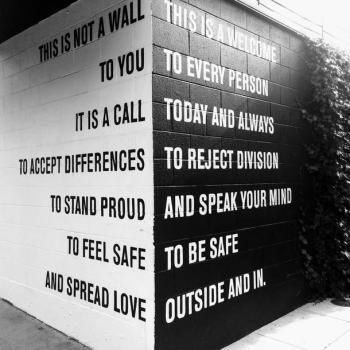I’ve been thinking divisions lately, since they seem to be so prominently highlighted in conversations, media, and politics.
The discussion last week in this space about “intolerance” is still raging.
My online friends are now neatly divided into political camps with heated exchanges on Facebook. Even in this forum, it seems as if every article I write someone tries to goad the division, to drive a wedge deeper.

Us Versus Them
The world has devolved into two basic groups — “Us” and “Them.” That’s it.
There’s the “Us,” which is the socio-economic group we identify based on what we think is important. Things like race and culture and gender and religion factor into the “us.” And other things like sports allegiances, dress standards, or homes also create groups we can identify with.
We are often identified by the part of town in which we live like, “The North Side,” “The Valley,” or “The 14th Street townhomes.”
There’s a huge swath of the world we simply don’t identify with or understand. That’s the them. This is a realistic chasm. Our known community u

nderstands our preferences and the perception is that the other side has “no idea.” They are different.
Too often, those allegiances and distinctions create an us versus them separation.
We like to be around people who are like us. That’s one reason why churches some 60 years after integration are still basically color-same. That’s why some people never moved to another part of town because they’re uncomfortable with the thought of “them.” It is really “divided we stand?”
The value of different thought
But having people around us who are not like us can be rewarding. And it’s stimulating intellectually, spiritually, and mentally to purposefully reach out and engage those who are not like us.
While some claim Christianity is exclusive, judgmental, and even racist, the very basis of the faith paints an entirely different picture. Galatians says, “There is neither Jew nor Gentile, neither slave nor free, nor is there male and female, for you are all one in Christ Jesus.”
The known dividers of the day when this is written are taken on, one-by-one
- Racism
- Religion
- Slavery
- and Sexism
They were all destroyed with a single verse. “You are all one in Christ.”
This is the real diversity, the real inclusion, the real unity.

The challenge
Just because we’re different doesn’t mean we are divided. The media loves to dig up differences. Politicians like to pick at the scabs we are trying to heal.
I take great umbrage at the general characterization of my attitudes simply because of my position in life. Just because I am white, doesn’t mean I’m racist. Just because I’m Christian, doesn’t mean I’m homophobic. Just because I’m American, doesn’t mean I hate Muslims.
Admittedly, I’m comfortable with my own people. Government worker. Christian. Suburban. Middle-age. But I confess my need to stretch my mind and my spirit.
I’m trying to purposefully find ways to connect with “Them” and see if I can jumpstart my soul. I do so not out of guilt or the need to make penance, but to see if there is something new for me to learn.
Is there something you can learn from “Them?”












